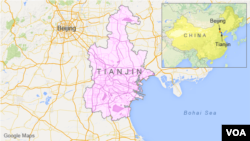Rain has begun to fall in China’s blast-struck northeastern port city of Tianjin as officials raced to prevent the further spread of hazardous chemicals and explosives from the site.
It was not immediately clear whether Tuesday's rain was helping spread a toxic mix of chemicals and dangerous materials from last week’s blasts or creating dangerous gases – as has been feared. Officials have assured the public that contingency measures are in place if the chemicals spread.
Authorities say some 3,000 tons of hazardous materials, including sodium cyanide and potassium nitrate, were stored at the site at the time of last week’s massive blasts. Tests by environmental authorities around the blast site have detected higher than normal levels of sodium cyanide at eight stations, one of which was 27 times above the national standard.
None of the readings that were above normal were in residential areas or outside the three-kilometer zone around the blast site, officials said.
At a briefing on Tuesday, Tianjin environmental official Bao Jingling estimated that in the crater of the blast site alone there are tens of thousands of tons of polluted water. Officials have built a dam around the crater to prevent leakage, they said.
Identifying victims
As the work continues to identify those who were killed in the blast, the death toll stood at 114 people on Tuesday, with 70 still missing, most of them firefighters. More than 700 people still remain hospitalized.
Questions have been rising about just how the company at the center of the disaster, Ruihai International, was able to operate so close to residential areas. According to national regulations, hazardous materials cannot be stored within one kilometer of major transportation routes or residences. The warehouse was in violation of both of those standards.
On Tuesday, the official Xinhua news agency also reported that Ruihai International did not even have a proper license to handle hazardous chemicals until two months prior to the blasts.
Corruption is widely suspected as playing a role in the disaster and 10 officials from the company have been held in police custody since last Thursday morning. Four of the company’s officials who are in custody are under close police watch at an undisclosed hospital.
According to Chinese language magazine, Caijing, Dong Mengmeng, the son of a former Tianjin police chief is among those in police custody.
Corruption investigation
The Communist Party’s anti-graft watchdog, the Central Commission for Discipline Inspection issued a statement on Tuesday saying the head of China’s State Administration for Work Safety was under investigation for corruption. The brief statement on the watchdog’s website did not mention the blasts in Tianjin, but the government department is one of the key state offices responsible for regulating companies that handle dangerous materials.
The statement only said the work safety head, Yang Dongliang, is “currently under investigation” for violating party discipline and the law.
Although officials repeated that operations at Tianjin’s port, the world’s 10th largest port, were back to normal on Tuesday, other reports suggest that is not entirely the case.
Calls to several businesses in the three-kilometer exclusive zone around the blast site went unanswered on Tuesday, with some phones disconnected.
Companies have reported that employees are refusing to show up for work and the cost of the estimated damages from the blasts both to the port area near the site of the disaster, residences, warehouses and business is expected to be massive.
According to Reuters news, the credit rating agency Fitch said the cost of damages from the blasts could exceed initial estimates, putting a strain on the finances of regional insurers. Estimates in Chinese media have put the damage from the blasts at more than $1 billion.



